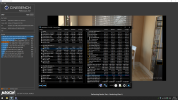Hello... not sure if I should start a new thread for this or just plop it here.
I've just upgraded to a Ryzen 5700X, and haven't really had any issues (only been a day so far). In fact I was surprised to see slightly cooler temps compared to the old R5 3600.
Just to be safe I pulled up HWiNFO, noticed a red Power Reporting Deviation value, and then thoroughly read the tool tip. So, I fired up 7zip benchmark to push the CPU to 100% usage. After 10 passes of the benchmark, I recorded an average of approx 120 % for the Power Reporting Deviation value.
When I first noticed this, I turned off PBO but this doesn't seem to have any effect. There may be other settings in the UEFI that I haven't touched yet, and I'm not sure where to look, or if I should be concerned.
My motherboard: Asus Tuf x570 Plus Wifi, UEFI version 4403
CPU temps are a comfortable 55 Celsius during the bench, so I'm not worried about that.
Any thoughts are appreciated, especially if anyone here is using the same motherboard as me.
Thanks.


